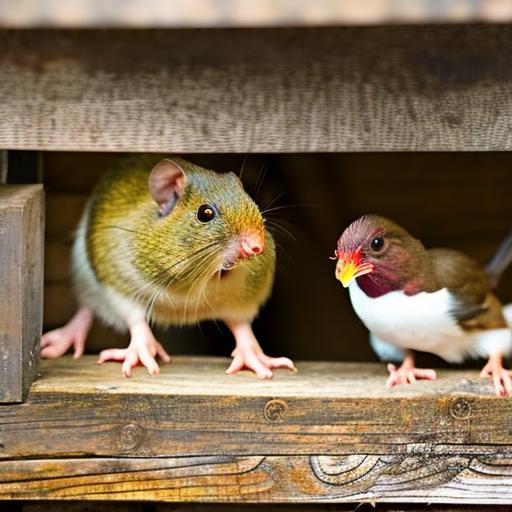Keeping a rat-free chicken coop is essential for the health and safety of your chickens and your family. Rats can cause significant harm to both, making it crucial to take proactive measures to prevent and eliminate rat infestations. Rats are not only carriers of diseases that can be transmitted to your chickens, but they can also attract predators to your coop and cause damage to your equipment. By understanding the signs of rat infestation, the dangers they pose, and the steps to take for rat control, you can ensure a rat-free and healthy environment for your chickens.
Key Takeaways
- A rat-free chicken coop is important for the health and safety of your chickens.
- Signs of rat infestation include droppings, gnaw marks, and missing eggs.
- Rats can spread diseases and parasites to your chickens, and can even kill them.
- Before eliminating rats, take steps to secure your coop and remove potential food sources.
- Natural methods of rat control include using essential oils and keeping a clean coop, while chemical methods have pros and cons.
Identifying the Signs of Rat Infestation in Your Coop
One of the first signs of a rat infestation in your chicken coop is the presence of droppings and urine stains. Rat droppings are small, dark, and pellet-shaped, while urine stains may appear as dark streaks on surfaces. Additionally, you may notice gnawed holes in feed bags or chewed wires in your coop. Rats have sharp teeth that they use to gnaw through various materials, including wood, plastic, and metal. Strange noises and smells can also indicate a rat infestation. Rats are nocturnal creatures, so you may hear scratching or scurrying sounds at night. They also have a distinct musky odor that can be detected in areas where they are present.
The Dangers of Rats in Your Chicken Coop
Rats can pose several dangers to your chicken coop and its inhabitants. Firstly, rats can spread diseases to your chickens. They are carriers of various pathogens, including Salmonella and Avian Influenza, which can be transmitted through contact with their droppings or urine. These diseases can cause illness or even death in your chickens. Secondly, rats can attract predators to your coop. Rats serve as a food source for larger predators such as snakes, raccoons, and foxes. If rats are present in your coop, it increases the likelihood of these predators being attracted to the area, putting your chickens at risk. Lastly, rats can cause damage to your coop and equipment. Their constant gnawing can weaken the structure of your coop, leading to potential collapses. They can also chew through wires, causing electrical hazards.
Steps to Take Before Eliminating Rats from Your Coop
| Steps to Take Before Eliminating Rats from Your Coop |
|---|
| 1. Inspect the coop and surrounding area for rat activity |
| 2. Seal any holes or gaps in the coop and surrounding area to prevent rats from entering |
| 3. Remove any sources of food or water that may be attracting rats |
| 4. Use traps or bait stations to capture or kill rats |
| 5. Dispose of dead rats properly to prevent the spread of disease |
| 6. Clean and disinfect the coop and surrounding area to remove any traces of rat activity |
| 7. Monitor the coop and surrounding area regularly to prevent future rat infestations |
Before you begin the process of eliminating rats from your chicken coop, there are several steps you should take to prepare. Firstly, thoroughly clean and sanitize your coop. Remove any debris or clutter that may provide hiding places for rats. Disinfect all surfaces with a poultry-safe cleaner to eliminate any bacteria or pathogens that may be present. Secondly, seal all entry points that rats may use to access your coop. Inspect the coop for any gaps or holes and use materials such as wire mesh or caulk to seal them off. Lastly, remove all food sources that may attract rats. Store chicken feed in secure containers that rats cannot access and clean up any spilled feed or food scraps.
Natural Methods of Rat Control in Your Coop
If you prefer to use natural methods for rat control in your chicken coop, there are several options available. One method is using essential oils and herbs that rats find repulsive. Peppermint oil, for example, has a strong scent that rats dislike and can deter them from entering your coop. You can place cotton balls soaked in peppermint oil around the coop or use a diffuser to disperse the scent. Another natural method is installing predator decoys such as fake owls or snakes near your coop. Rats are naturally wary of predators and may avoid areas where they believe they are present. Additionally, ultrasonic devices emit high-frequency sounds that are unpleasant to rats but inaudible to humans. These devices can be placed in your coop to deter rats from entering.
Chemical Methods of Rat Control: Pros and Cons

Chemical methods of rat control can be effective but come with their own set of pros and cons. One common method is using rat poison, which is typically placed in bait stations or traps. Rat poison contains toxic substances that are lethal to rats when ingested. However, there are risks associated with using rat poison, as it can also be harmful to other animals and pets if accidentally consumed. Another chemical method is using rat repellents, which are substances that emit odors or tastes that rats find unpleasant. These repellents can be sprayed or applied to areas where rats are likely to be present. While they may be effective in deterring rats, they may also have a strong odor that can be unpleasant for humans.
Choosing the Right Rat Traps for Your Coop
When it comes to choosing the right rat traps for your chicken coop, there are several options available. Snap traps are the most common type of rat trap and consist of a spring-loaded bar that snaps shut when triggered by the rat. These traps are effective but require caution when setting them to avoid injury. Another type of trap is the glue trap, which consists of a sticky surface that rats get stuck on when they walk over it. Glue traps are easy to use but may not be as humane as other options. Live traps are another option, where rats are captured alive and can then be released elsewhere. These traps require regular checking and may not be as effective if you have a large rat population.
How to Bait and Set Rat Traps for Maximum Effectiveness
To ensure maximum effectiveness when baiting and setting rat traps, there are a few key considerations. Firstly, choose the right bait that will attract rats. Peanut butter, bacon, or dried fruit are commonly used as bait for rat traps. Place a small amount of bait on the trap trigger to entice the rat to approach and trigger the trap. Secondly, proper trap placement is crucial. Set traps in areas where rats are likely to travel, such as along walls or near entry points. Rats typically follow the same paths repeatedly, so placing traps along these routes increases the chances of capturing them. Lastly, check and reset traps regularly. Rats can be cautious creatures and may avoid traps that have already caught one of their kind. Check traps daily and reset them as needed to increase your chances of eliminating the rat population.
Preventing Future Rat Infestations in Your Coop
Once you have successfully eliminated rats from your chicken coop, it is important to take steps to prevent future infestations. Regular cleaning and maintenance of your coop is essential. Remove any debris or clutter that may provide hiding places for rats and regularly disinfect surfaces to prevent the buildup of bacteria or pathogens. Proper food storage is also crucial in preventing rat infestations. Store chicken feed in secure containers that rats cannot access and clean up any spilled feed or food scraps promptly. Lastly, seal all entry points that rats may use to access your coop. Regularly inspect the coop for any gaps or holes and use materials such as wire mesh or caulk to seal them off.
Enjoying a Rat-Free and Healthy Chicken Coop
In conclusion, keeping a rat-free chicken coop is vital for the health and safety of your chickens and your family. Rats can spread diseases to your chickens, attract predators to your coop, and cause damage to your equipment. By identifying the signs of rat infestation, understanding the dangers they pose, and taking proactive steps for rat control, you can ensure a rat-free and healthy environment for your chickens. Whether you choose natural methods or chemical methods, selecting the right traps, baiting and setting them effectively, and implementing preventive measures will help you maintain a rat-free coop. By following these guidelines, you can enjoy the benefits of a rat-free and thriving chicken coop.
If you’re dealing with a rat infestation in your chicken coop, it’s important to take immediate action to protect your flock. Rats can pose a serious threat to the health and safety of your chickens, so it’s crucial to address the issue promptly. In a recent article on Poultry Wizard, they provide helpful tips and strategies on how to get rid of rats in your chicken coop. From sealing entry points to using traps and deterrents, this article offers practical solutions to keep your coop rat-free. Check out the article here for more information on effectively dealing with rat infestations in your chicken coop.
FAQs
What are the signs of rats in a chicken coop?
Some signs of rats in a chicken coop include droppings, gnawed feed bags, chewed wires, and missing eggs.
Why are rats attracted to chicken coops?
Rats are attracted to chicken coops because of the availability of food, water, and shelter. Chicken feed and eggs are a primary food source for rats.
What are some ways to prevent rats from entering a chicken coop?
Some ways to prevent rats from entering a chicken coop include sealing all openings, using hardware cloth to cover vents and windows, and keeping the coop clean and free of food debris.
What are some methods for getting rid of rats in a chicken coop?
Some methods for getting rid of rats in a chicken coop include using traps, poison bait, and electronic repellents. It is important to follow safety precautions when using these methods.
How can I keep rats from returning to my chicken coop?
To keep rats from returning to your chicken coop, it is important to maintain good sanitation practices, store feed in sealed containers, and regularly inspect the coop for any openings or signs of rat activity.
Meet Walter, the feathered-friend fanatic of Florida! Nestled in the sunshine state, Walter struts through life with his feathered companions, clucking his way to happiness. With a coop that’s fancier than a five-star hotel, he’s the Don Juan of the chicken world. When he’s not teaching his hens to do the cha-cha, you’ll find him in a heated debate with his prized rooster, Sir Clucks-a-Lot. Walter’s poultry passion is no yolk; he’s the sunny-side-up guy you never knew you needed in your flock of friends!







